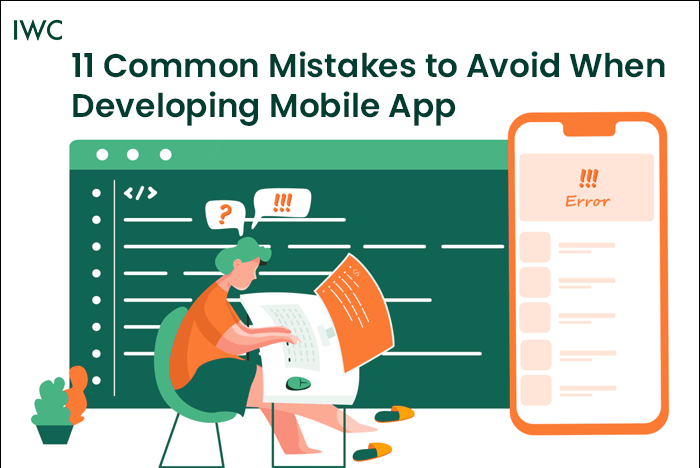11 Common Mistakes to Avoid When Developing Mobile App

Introduction
Mobile apps have become an important part of users' lives nowadays. If you are a mobile app developer and intend to develop an excellent app, then it is very important for you to follow some precautions. In this blog, we will tell you about 11 common mistakes while developing a mobile app so that you can avoid them and launch your app successfully.
How Engagement Affects in Your App Success?
When we make an app, it's really important to think about how much people are using it. This is called "engagement." Engagement means how much users are interacting with and liking your app.
If lots of people are using your app a lot, that's good! It means they find it helpful and interesting. They'll probably keep using it and tell their friends about it. But if not many people are using your app, that's not good. It means they don't really see the point of it. They might stop using it, write bad reviews, and not recommend it to others.
So, it's really important to pay attention to how engaged users are with your app. This helps make sure people have a good experience with your app, they like using it, and it keeps growing.
To measure engagement, we look at things like how long people stay on the app, how many pages they look at, and what they do while using it. Other things we can check are user feedback, how many people keep using the app, reviews in the app stores, and asking users questions directly in the app. These help us understand what people like and don't like about the app, so we can make it better.
11 Common Mistakes to Avoid When Developing Mobile Application
1. Neglecting Market Research
Before diving headfirst into the development process, it's crucial to conduct thorough market research. Many developers make the mistake of neglecting this step, leading to a lack of understanding of their target audience and competition. By conducting market research, developers can gain valuable insights into user preferences, market trends, and competitors' strategies. This information is invaluable in shaping the direction of the app and ensuring its relevance and competitiveness in the market.
2. Overlooking Platform Compatibility
In the rapidly evolving world of mobile technology, it's essential to consider platform compatibility when developing a mobile app. Ignoring platform differences and focusing solely on one platform can alienate a significant portion of potential users. Whether it's iOS, Android, or both, developers must ensure that their app functions seamlessly across different platforms to maximize its reach and accessibility.
3. Failing to Define Clear Objectives
One common mistake among developers is starting the development process without clearly defined objectives. Without a clear vision of what the app aims to achieve and who its target audience is, developers risk creating a product that lacks direction and fails to meet users' needs. By setting clear and achievable objectives from the outset, developers can stay focused throughout the development process and deliver a more coherent and effective app.
4. Ignoring User Experience
User experience (UX) plays a critical role in the success of a mobile app. Unfortunately, many developers prioritize features and functionality over user experience, leading to frustrating and confusing app interfaces. To avoid this mistake, developers should prioritize UX design from the early stages of development, focusing on intuitive navigation, responsive design, and seamless interactions to enhance user satisfaction and retention.
5. Overcomplicating the User Interface
While it's essential to offer a feature-rich app, developers should be cautious not to overcomplicate the user interface (UI). A cluttered and confusing UI can overwhelm users and deter them from engaging with the app. Instead, developers should strive for simplicity and clarity in design, prioritizing ease of use and intuitive navigation to ensure a positive user experience.
6. Neglecting Performance Optimization
Performance optimization is often overlooked during the development process but is crucial for ensuring the smooth operation of a mobile app. Slow loading times, frequent crashes, and excessive battery consumption can frustrate users and lead to negative reviews and uninstallations. To avoid this, developers should prioritize performance optimization techniques such as code optimization, caching, and minimizing resource usage to deliver a fast and responsive app experience.
7. Skipping Testing and Quality Assurance
Testing and quality assurance are integral parts of the app development process, yet many developers skimp on these crucial steps in a rush to release their app. Failing to thoroughly test the app for bugs, glitches, and compatibility issues can result in a subpar user experience and damage the app's reputation. Developers should invest time and resources in comprehensive testing across various devices and environments to identify and address any issues before launch.
8. Neglecting Security Measures
Security should be a top priority for any mobile app, especially those handling sensitive user data or transactions. However, many developers overlook security measures during the development process, leaving their app vulnerable to cyber threats and attacks. To mitigate these risks, developers should implement robust security measures such as encryption, secure authentication, and regular security updates to protect user data and safeguard the app against potential breaches.
9. Underestimating Maintenance and Updates
Developing a mobile app is not a one-time endeavor but an ongoing process that requires regular maintenance and updates. Many developers underestimate the importance of post-launch support, leading to neglected apps with outdated features and compatibility issues. To keep their app relevant and competitive, developers should allocate resources for regular maintenance, bug fixes, and updates to address user feedback and evolving market trends.
10. Neglecting User Feedback and Analytics
User feedback and analytics provide valuable insights into how users interact with the app and what improvements can be made. However, many developers neglect to gather and analyze this data, missing out on opportunities to enhance their app's performance and user experience. By actively soliciting user feedback and monitoring app analytics, developers can identify areas for improvement and make data-driven decisions to optimize their app for better user engagement and retention.
11. Lack of Marketing and Promotion
Even the most well-designed and feature-rich app can fail to gain traction without effective marketing and promotion. Yet, many developers make the mistake of neglecting marketing efforts until after the app has been launched. To maximize visibility and attract users, developers should develop a comprehensive marketing strategy that includes pre-launch promotion, app store optimization, social media marketing, and ongoing promotional activities to ensure continued growth and success.
Do You Want to Develop Mobile App for Your Business?
Are you considering developing a mobile app for your business? Look no further than Indian Website Company (IWC). We're passionate about delivering top-notch digital products, specializing in mobile applications and crafting exceptional user experiences. Whether you're a startup or a well-established enterprise, we're here to transform and empower your business through innovative mobile solutions.
When it comes to mobile phone app development, Indian Website Company is a leading Android and iOS app development company in India offers android and iPhone app development services at competitive pricing without compromising on quality. We understand the importance of budget considerations for businesses, and our goal is to provide cost-effective solutions tailored to your specific needs. With our expertise and dedication to excellence, we ensure that your investment in mobile app development yields maximum returns for your business.
Conclusion:
Developing a successful mobile app requires careful planning, execution, and ongoing maintenance. By avoiding the common mistakes outlined in this guide and prioritizing user experience, performance, security, and marketing, developers can increase the likelihood of their app's success in the competitive app market. By learning from these mistakes and continuously striving for improvement, developers can create innovative and engaging mobile apps that resonate with users and stand the test of time.
Recent Blogs

Why is a Dynamic Website Good?

How to Grow Your Small Business with a Website
